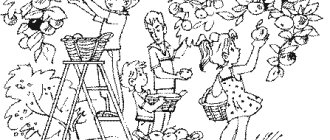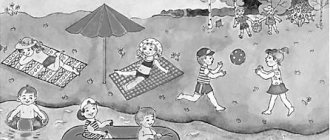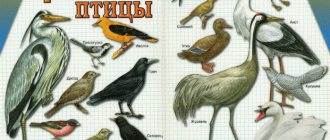TASKS FROM Speech therapist for THIRD GRADERS (we work at home)
Slide 1
NAME ADJECTIVE Guess the riddle: The motley fidget, the long-tailed bird: The talkative bird, the most talkative. WHO IS THIS ? What part of speech do the highlighted words belong to? Determine the topic of the lesson. As you study the topic and complete practical tasks, find answers to the questions: What is an adjective? What questions does an adjective answer? How can an adjective change? What parts of speech do adjectives belong to in a sentence? (with what words are they “friends”?)
Slide 2
An independent part of speech that denotes a feature of an object and answers the questions: what? which? which? which? whose? called... ADJECTIVE
Slide 3
Exercise No. 1. The adjective changes according to gender. Match the words objects to the signs. Distribute them into columns. Hare, blanket, snow, owl, cloud, sugar, ceiling, wall, chalk, board, shirt, lime, window, birch, towel. Exercise No. 2. The adjective changes according to numbers. Read the phrases in the singular and change them to plural. For example: sunbeam - sun rays Birch stump - ... Wooden chair - ... Clean window - ... Starry night - ... Exercise No. 3. Insert into the sentences suitable words that denote the characteristics of objects. Write down the sentences and ask questions about the inserted words. Cabbage was ripening in the garden. Masha ate... a plum. A bridge led across the ravine. There were a lot of... carrots in the garden. There were...fruits on the plate. The buds on the birch trees are swollen. White (m.r.) White (f.r.) White (m.r.) Tall tree-…. Kind heart - ... Gold coin - ... Bat - ... which one? juicy
Slide 4
How do adjectives agree with nouns? An adjective always refers to a noun and is “friends” with it. An adjective has the same grammatical features as the noun with which it is associated. This ability is called coordination. An adjective always has the same gender, number and case as the noun with which it is associated. This means that an adjective can change in number, gender and case.
Slide 5
Spring morning Spring morning has arrived in the forest. A huge red sun rolled out from behind the horizon. The sun's rays hit the thick fog and it swirled with pink steam. A tiny bump woke up on a pine tree. The little one looks at the wide field across the river. She sees slender spruce trees with fluffy branches, listens to the joyful singing of birds, and inhales the aroma of spring air. All nature rejoices in spring with her. Exercise No. 4 Copy the text. Highlight the adjectives in the text. Determine their gender, number, case. Now follow the arrow to return to the beginning of the presentation and answer the questions. Was everything clear to you?
Slide 6
ADJECTIVE What is an adjective? What questions does an adjective answer? How can an adjective change? What parts of speech do adjectives belong to in a sentence? (what words are “friends” with?) Thank you for your work
The history of the creation of a new direction in the work of a speech therapist teacher.
The work of a speech therapist at school is mainly associated with primary classes.
Therefore, the proposal to conduct trainings with high school and college students seemed interesting. Moreover, we organized this work together with an educational psychologist as part of the project of the club for schoolchildren “Soft skills 2035” under the leadership of the city methodological center. Trainings were held monthly throughout the academic year. They were aimed at developing creativity in thinking and speech, stress resistance, goal setting, etc. It would seem that this is more of a psychological area of knowledge. However, speech therapy exercises and tasks were selected for each topic to solve various problems.
For example, in the training “Stress resistance. From A to Z,” the guys learned to breathe correctly before speaking at the defense of a project or term paper; prepare organs of articulation for public speaking on stage in front of an audience and in class. I would like to note that both students and students completed all the exercises with pleasure. They noted that participation in the trainings was very informative and interesting. And the resulting material can be useful to them in various situations.
I want to share my experience of this work with my colleagues. I bring to your attention a part of the training related to speech therapy aspects.
I plan to continue the series of publications of methodological material for other trainings. Thank you!
Training for college students and students in grades 9-10
ANNEX 1
Exercise “I am an editor”
A tale about black grouse (Sample: original text, words selectively underlined).
I wanted to build a black grouse house. Thought and thought:
“There is no ax, there are no blacksmiths - there is no one to forge an ax, there is no one to build a house” ... “Why should I start a house? One night went anywhere!” Plunging into the snow!
Everyone played, wandered in the grass, looked for where to make nests, lay eggs and hatch babies.
He spent the night in the snow, got up early in the morning, flew around the free world, shouted loudly, loudly, and looked for his comrades. I went down to earth and met my friend.
We walked with the children into an open field, fed the children with midges, took them out into the open world, flew around the free world and again spent the night in the snow in the winter.
A tale about black grouse (Sample: after editing the text by high school students).
I wanted to build a black grouse house. Wiggled my brains:
“I couldn’t find an axe, there were no blacksmiths—no one to help him build a house. “Why start a house? Just survive one night!” Blink into the snow!
They played, wandered, looking for where to build a house, lay eggs and raise babies.
He spent the night in a snowdrift, got up very early, flew around the world, shouted loudly, excitedly, and looked for his comrades. I went downstairs and met my friend.
We walked with the children into an open field, fed the kids midges, introduced them to the free world, flew around and again spent the night in the snow.
Ryaba hen
Once upon a time there lived a grandfather and a woman. They had Ryaba chicken. The hen laid an egg, not an ordinary one - a golden one. Grandfather beat and beat, but did not break. The woman beat and beat, but did not break. The mouse was running, its tail touched it, the egg fell and broke. The grandfather is crying, the woman is crying, and the hen is clucking: “Don’t cry, grandfather, don’t cry, woman: I will lay you an egg, not a golden one, but a simple one!”
THE CARPENTER AND THE CAT (Japanese fairy tale)
Once upon a time there lived a poor carpenter, and he had a cat. The owner loved his cat and brought her fish every evening. The cat also loved the carpenter. But then one day an illness attacked the carpenter: his eyes began to go blind. He can’t work, there’s no money at all, there’s nothing to buy fish for the cat. So he says to her: “Even though we lived poorly with you, it was still bearable.” And now I’m completely blind, I have nothing to feed you with. You'll have to look for another owner. The carpenter fell asleep. And the cat came up to him and began to lick his eyes. First the left, then the right, left, right, left, right... Ten days passed, the carpenter’s eyes stopped hurting, and he began to see as before.
THE GRATEFUL BEAR (Mordovian fairy tale)
A girl is walking through the forest, and a bear comes towards her, walking on two legs, like a man. The girl was scared, she wanted to run away, but she couldn’t move from her place due to fear. And the bear came up and extended its paw. The girl looks, and there is a splinter in her paw. She pulled out the splinter, the bear bowed and went into the forest. No one in the village believed her, and she went back into the forest. She looked up, and there was a bear in front of her. He holds a large beehive of honey in his paws. He placed the beehive in front of the girl, bowed again and went into the forest. The whole village ate this honey.
THE WOLF AND THE RAM (Lithuanian fairy tale)
The wolf saw the ram and said to him: “Listen, ram, I’ll eat you now.” - There's nothing you can do - eat. I just ask you not to ruin my skin. You stand by the fence, open your mouth well, I’ll run and jump right into your throat. The wolf spread his legs, opened his mouth and waited. The ram ran away and - fuck! - a wolf with horns on the forehead. The wolf fell unconscious, and the ram - don't be a fool - ran away. The wolf lay down and thought: “Did I eat it or not? He must have eaten it!..”
TWO CAMELS (Kurdish fairy tale)
Two camels, the older and the younger, were grazing in a green meadow. The younger one always lagged behind the older one. The eldest decided to tease his young companion and said to him with mockery: “After all, we are not walking along a narrow path, there is enough room for you even next to me.” Why are you always reaching behind? “What can you say about politeness,” answered the younger one. “You should always let older people go first, right?” Why does a donkey have long ears (Ingush fairy tale) The donkey learned that ears give away. He didn't know exactly what ears were, but had only heard about them. He came to the place where ears were distributed and shouted: “Are ears distributed here?” “Here,” they answer him. - What are they like? - Whatever you want. There are small ones, there are large ones, there are long ones, there are round ones... - How much do they cost? - They are given for free. “If ears are given for free, then what kind of fool would take small ones.” That's why the donkey has such long, long ears.
HOW THE HEDGEHOG INVENTED THE SICKLE (Nogai fairy tale)
In ancient times, people, like animals, ate grass. They got tired of eating grass, so they sowed wheat, but no one knew how to harvest the crop. All the people and animals came together and began to ask each other how to collect the grain. “The wise hedgehog knows everything,” said one old man, “but he is not with us.” He is very touchy, probably someone laughed at him... And when the hedgehog is angry, he talks to himself. If you listen, you can hear good advice. The cat volunteered to listen. She quietly crept up to the hedgehog and heard him grumble: “How stupid these people are!” What's easier: take a strip of iron and hit it with a hammer until it looks like a new moon. Then cut the cloves, and the sickle is ready. The cat remembered these words, passed them on to people, people made sickles and harvested the crops.
HOW THE HARE RESCUE THE ELEPHANT (Vietnamese fairy tale)
The hare asked the elephant why he looked sad. “I lost the bet to the tiger,” answered the elephant, “and tomorrow he must eat me.” - Don’t be sad, I’ll help you out, uncle elephant. Come here tomorrow. The next morning the hare told the elephant to kneel down, jump on his back and wait for the tiger. As soon as the tiger's shadow flashed, the hare began to chew something and shout to the whole forest: “Ha-ha!” I had already eaten my fill of elephant meat, and now I wanted to eat a tiger! Where can I get this beast? The tiger got scared and ran away.
SMART BUFFALO (Chinese fairy tale)
The tiger lay in wait for the buffalo and wanted to eat it. But he said: “Your teeth are too dull, you won’t be able to bite through my skin.” Let's meet in three days. You sharpen your teeth, and I will sharpen your horns. Then we'll fight. For three days the tiger sharpened his teeth, and the buffalo did something completely different. He wrapped himself in straw and rolled on the ground until he was covered with a thick layer of clay. On the appointed day, the tiger and buffalo appeared at the appointed place. Three times the tiger sank his fangs into the body of the buffalo, but only bit through the dried clay. And then the buffalo gored the tiger so hard three times that he lost his breath. Since then, people consider the buffalo to be the smartest animal.
WHY MOOSE AND RRAM HORNS GROW (Chukchi fairy tale)
A bear once asked a moose: “Why are all the animals different?” Branched trees grow on your head, but not on mine. “And, it’s true: we are not at all alike,” the elk agreed after thinking, “why would that be?” They met a mountain sheep. - Tell me, ram, why we don’t look alike. And you are not like us. There are two thick logs growing on your head. The animals sat down and began to think about why they were different from each other. We thought for a long time. Finally the elk begged: “No, I can’t think anymore.” My head hurt. “And my head is spinning from thinking,” the ram supported him and ran away with the elk. “It turns out that’s why we’re not alike,” the bear guessed. “The elk and the ram are stupid, they can’t think, so all sorts of rubbish has grown on their heads.”
THE CHICKEN AND THE BAT (Buryat fairy tale)
The chicken wanted to make friends with the bat. The chicken flew up to the roost and cackled: “Where are you, neighbor, I came to make friends with you.” “I can’t get out,” the bat answered her from the dark crevice. — During the day, the heat will dry out my wings. At dusk, the bat flew to the chicken. - Chicken, good evening, I came to visit you. “I don’t see anything at night,” the chicken answered plaintively. - I won’t be able to treat you. So a chicken and a bat cannot become friends. The chicken is hindered by the night, and the bat by the day.
THE CARPENTER AND THE CAT (Japanese fairy tale)
Once upon a time there lived a poor carpenter, and he had a cat. The owner loved his cat and brought her fish every evening. The cat also loved the carpenter. But then one day an illness attacked the carpenter: his eyes began to go blind. He can’t work, there’s no money at all, there’s nothing to buy fish for the cat. So he says to her: “Even though we lived poorly with you, it was still bearable.” And now I’m completely blind, I have nothing to feed you with. You'll have to look for another owner. The carpenter fell asleep. And the cat came up to him and began to lick his eyes. First the left, then the right, left, right, left, right... Ten days passed, the carpenter’s eyes stopped hurting, and he began to see as before.
Why does a chicken lay eggs (African tale)
The forest bird said to the chicken: “Why don’t you fly?” You have wings. The chicken was offended that a stranger was interfering in her affairs and wanted to leave. But the bird continued: “Soon your master will kill you.” It's better to go into the forest. The chicken did not pay attention to these words either, but soon learned that the owner was really going to kill her. The bird advised: “You must lay eggs every day, then the owner will leave you alive.” The chicken did just that and was very grateful to the forest bird for the owl.










